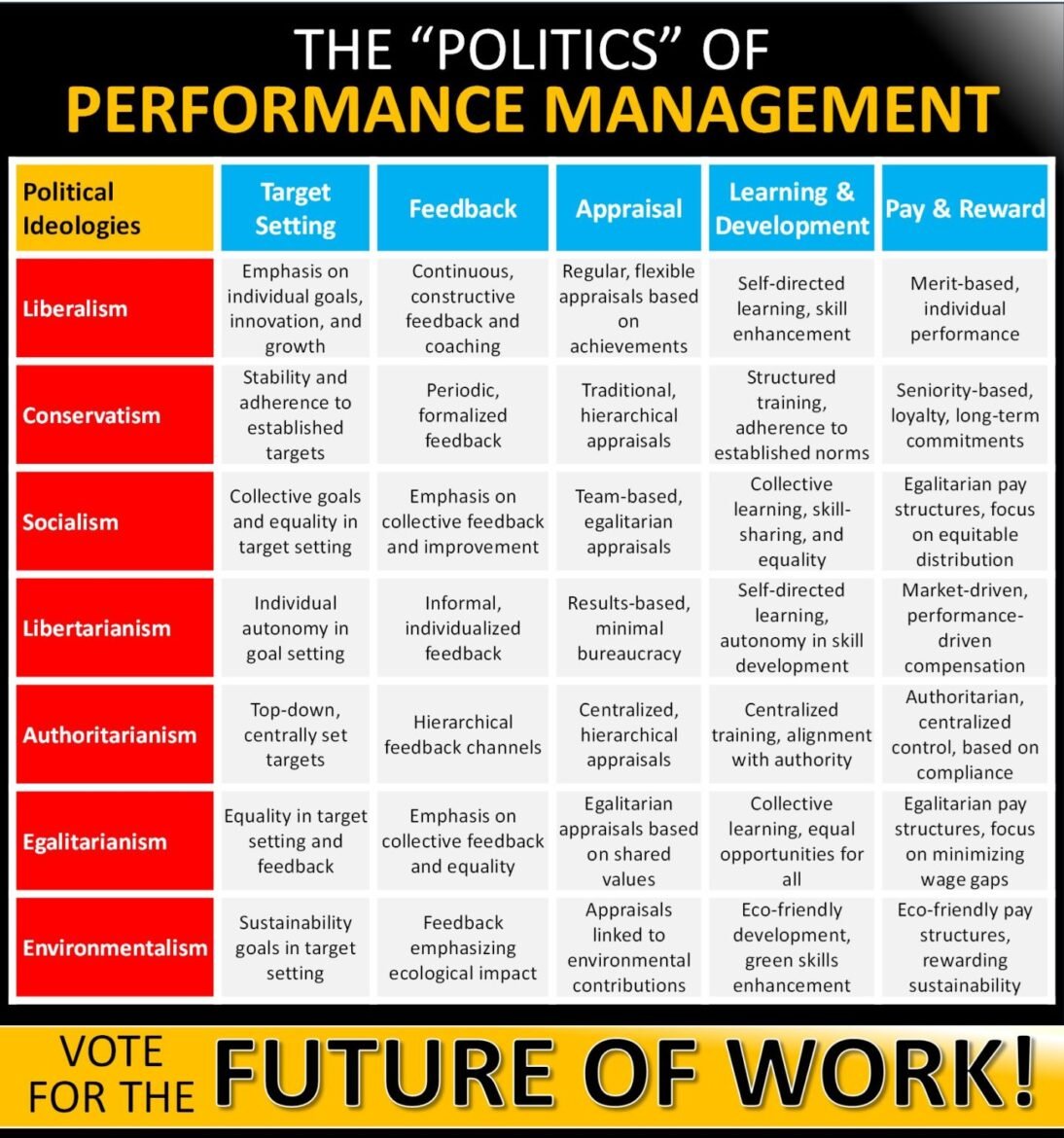WHY SHOULD YOU CARE?
This article is a must-read as it challenges the outdated norms of performance management, advocating for a transformative approach tailored to the 21st-century workplace. By integrating insights from diverse ideological perspectives from the founder of Good Organisations, Otti Vogt it offers a nuanced understanding of how performance management can evolve to foster creativity, collaboration, and organizational well-being. It’s an essential guide for anyone looking to align modern business practices with the evolving demands of today’s workforce.
It is no-brainer, that anaging employee performance is key to any company’s success. Otti Vogt, one of the Top Voice on Leadership on Linkedin, who founded Good Organisations and served as the COO of ING Banks, highlights that our current methods of evaluating and managing performance are outdated and ineffective. Traditional approaches, deeply embedded in corporate practices, often create more problems than they solve. They can be rigid, demotivating, and disconnected from the real drivers of business success, leading to inefficiencies and frustrations both for employees and managers. Vogt suggests that a major overhaul is necessary. We need to move away from these old methods and embrace new strategies that are adaptable, fair, and more aligned with today’s dynamic business demands. This shift is crucial not just for improving day-to-day operations, but also for fostering a more engaged and productive workforce.
The Shortcomings of Traditional Performance Management:
The existing paradigms of performance management have often been critiqued for their narrow focus on short-term profits, treating employees as mere cogs in the vast machinery of the corporation. This approach not only undermines the intrinsic human potential within the workforce but also fosters a culture antithetical to collaborative and creative work environments. In these traditional models, there’s a prevalent culture of fear and competition, overshadowing the possibilities for cooperation, creativity, and systemic flourishing.
Moreover, these outdated practices are heavily skewed towards quantitative and financial metrics, sidelining the significant qualitative aspects of performance. This imbalance leads to a narrow focus on easily measurable outcomes, neglecting broader impacts such as systemic, ecological, and social considerations, as well as individual development and well-being.
Another critical flaw in conventional performance management is its retrospective nature, primarily through annual or biannual reviews. This approach fails to capture the dynamic and evolving contributions of employees, offering a static and often outdated snapshot of performance that does not reflect ongoing growth and challenges.
Lastly, the bureaucratic and time-consuming nature of traditional performance appraisals not only adds to organizational costs but also breeds disengagement and dissatisfaction among employees. This approach contributes to a collective squandering of human potential, as it fails to recognize and nurture the diverse talents and aspirations of the workforce.
Recognizing these deep-seated issues, Vogt’s call to action is not merely for incremental changes but for a fundamental revolution in how organizations approach performance management. This is a call to dismantle the outdated, rigid structures and to foster innovative, flexible, and humane practices that align with the evolving nature of work and the aspirations of a modern workforce. It’s about creating systems that not only drive organizational success but also contribute to a more equitable and inspiring workplace experience.
As we embark on this journey of reimagining performance management, it is essential to understand that this is not a solitary endeavor. It requires a coalition of the willing – a collaborative effort of thought leaders, practitioners, and organizations – to challenge the status quo and advocate for a more progressive, inclusive, and dynamic approach. This collective effort is driven by a shared commitment to reinventing performance management in a way that resonates with the 21st-century ethos, prioritizing human dignity, organizational well-being, and societal impact.
In the following sections, we delve deeper into various ideological perspectives on performance management, exploring how they can inform and shape this much-needed transformation in the corporate world.
Ideological Lenses in Performance Management
Performance management isn’t just a business process; it’s a reflection of an organization’s underlying ideology. This perspective is vividly brought to light by Otti Vogt in a recent LinkedIn post, encouraging us to examine our approach to performance management through various ideological lenses: liberal innovation, conservative stability, socialist equality, libertarian autonomy, authoritarian control, and environmental sustainability.
Each of these ideologies offers a unique perspective on managing and evaluating performance, from creativity-embracing liberal innovation to order-prioritizing conservative stability.
Liberal Innovation: Agility and Creativity: Organizations embracing liberal innovation in performance management focus on flexibility, continuous feedback, and adaptive learning. This approach aligns with the dynamic nature of today’s work environments, where change is constant, and creativity is a valuable commodity. It fosters a culture where individual freedom is celebrated, and market dynamics are embraced, allowing for a more organic and evolving performance assessment.
Conservative Stability: Tradition and Reliability: Conversely, conservative stability leans on proven methods and long-term planning. This ideology suits organizations that prioritize reliability and structured processes. Here, performance management is about creating a stable environment where employees know what to expect and what is expected of them, offering a sense of security and predictability.
Socialist Equality: Fairness and Collective Goals: The socialist equality approach to performance management emphasizes fairness and collective success. It’s about ensuring that resources and opportunities are distributed equally, and performance metrics are designed to reflect collective achievements rather than individual accomplishments. This ideology resonates with organizations that view their employees as a unified whole working towards a common goal.
Libertarian Autonomy: Self-Direction and Minimalism: In a libertarian model, performance management is about self-direction and minimal bureaucracy. It champions individual freedom and personal goal-setting, giving employees the autonomy to chart their own course within the organization. This approach can be powerful in environments where innovation and individual initiative are highly valued.
Authoritarian Control: Efficiency and Centralization: Authoritarian control in performance management is about centralizing authority and setting strict targets. It might seem archaic in today’s dynamic business world, but it can be effective in situations where quick decision-making and clear directives are critical. This approach ensures efficiency and alignment with organizational goals but might stifle creativity and individual expression.
Environmental Sustainability: Beyond Business Metrics: Incorporating environmental sustainability into performance management is no longer a novel idea but a necessity. It involves integrating environmental KPIs, promoting sustainable practices, and ensuring that individual goals align with broader ecological objectives. This approach is increasingly important as businesses acknowledge their role in the global ecological landscape.

Conclusion: A Call for a Collaborative Reimagining and Ongoing Dialogue
The journey towards redefining performance management is not a destination, but a continuous, collaborative process. It calls for dismantling outdated practices and adopting innovative solutions tailored to the diverse needs and values of each organization. As we venture forward, it’s crucial to maintain an active dialogue, delving into the interplay of various ideologies and their implications for the future of work.
This conversation is set to continue in a significant way, with Otti Vogt and his colleague, Dr. Antoinette Weibel leading the discussion at The HR Congress World Summit in Porto on May 14-15. This event promises to be a groundbreaking forum for exchanging ideas and insights on reimagining performance management. Here, thought leaders and practitioners will gather to explore ways to create work environments that are not only more equitable and humane but also inspiring and conducive to personal and organizational growth.
In essence, reimagining performance management is more than a mere business necessity; it represents a profound opportunity to reshape workplaces into spaces that truly reflect our collective aspirations and societal values. It’s about forging a path towards a business world that doesn’t just thrive in the 21st century but flourishes with a sense of purpose and inclusivity.
The dialogue at The HR Congress World Summit will undoubtedly be a pivotal step in this ongoing journey, fostering a community eager to pioneer a new era of performance management.












